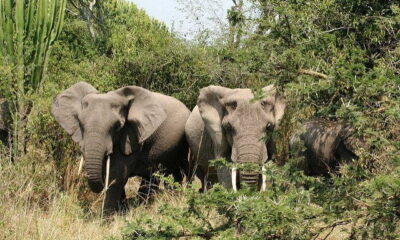

Environment
Food security: businesses want government intervention, to avoid long term risk
A new report from WWF-UK finds that businesses want to see government taking bold actions to create a food system that serves citizens, the economy and planet alike. Businesses must also actively seek opportunities to work together for sustainable food security, the report says, and the government must create the conditions to make it easier for businesses to collaborate to deliver long-term food security for all.
The report, produced with the Food Ethics Council, is entitled ‘From individual to collective action: exploring the business case for addressing sustainable food security’. It looks at moving ‘from individual to collective action’ and concludes that sustainable food security delivers long-term business security.
It highlights the huge risks to business, people and planet if the food security challenge is not met head on – and the opportunities for businesses to join forces and work towards common goals.
Currently, 85% of global fisheries may be over their maximum capacity or over exploited, and 70% of all extracted water relates to food production. The world’s population and inequality in calorific intake are only set to increase.
The report finds that the widespread perception of the food security challenge is still limited to ‘needing more food’, rather than including equally important aspects such as access to food and the environmental impacts of food from field to fork.
A limited knowledge amongst businesses of how to deal with the range of issues associated with production – growing demand, climate change, deforestation, water management, fossil fuel dependence, soil fertility and biodiversity loss – further increases the risks.
Sustainability must be at the core of food production and consumption if true food security is to be established, the report finds. Defining the meaning of genuine long-term food security within a food business and across the sector is a crucial first step.
Businesses need to accelerate their contribution to addressing sustainable food security, and the report identified some key steps businesses can take:
- Understand local food insecurity issues in a global context, looking at where you source from and sell to;
- Explore actions for the benefit of a wider society;
- Only consider commercial benefits alongside social benefits;
- Lobby for a step-change in the wider business environment to support food security goals.
The report concludes that businesses must collaborate to safeguard their own future – and that of the sector as a whole. It offers practical advice from businesses already working on sustainable food security, and tips on strengthening the business case.
Duncan Williamson, WWF-UK expert on sustainable food security, said “It’s heartening to see that more companies are grappling with the issues of sustainable food systems, but if we’re all to reap the benefits, they need to act boldly, and quickly.”
Dan Crossley, Executive Director of the Food Ethics Council added “In working on this report with WWF-UK, it became increasingly clear that some food businesses have a narrow understanding of food security. We’d urge them to join forces to tackle the issues head on, to safeguard their own futures, and at the same time the long-term wellbeing of their customers, workforce, producer communities and the planet.”


 Features11 months ago
Features11 months agoEco-Friendly Cryptocurrencies: Sustainable Investment Choices

 Energy11 months ago
Energy11 months agoThe Growing Role of Solar Panels in Ireland’s Energy Future

 Energy10 months ago
Energy10 months agoGrowth of Solar Power in Dublin: A Sustainable Revolution

 Energy10 months ago
Energy10 months agoRenewable Energy Adoption Can Combat Climate Change




























